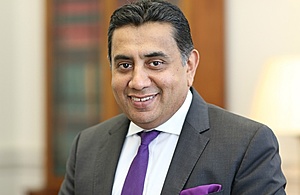PM recognises Captain Tom as neighbourhood ‘Point of Light’
Captain Tom Moore, who has famously raised £30million for the NHS by walking over 100 laps of his garden, has been named a Point of Light winner by Prime Minister Boris Johnson.
The Prime Minister wrote to the inspirational veteran to give him the award and to mark his 100th birthday, one of many accolades Captain Tom, or the newly appointed Colonel Tom, has been given to celebrate his incredible achievement. He has also been appointed as the first Honorary Colonel of the Army Foundation College in Harrogate, re-presented with his Second World War Defence Medal which he had previously misplaced and today, two flypasts took place by Army Air Corps helicopters and the Battle of Britain Memorial Flight.
In his letter to Captain Tom, the Prime Minister said:
Every day, I write to someone in our country to thank them for their service to others and to recognise them as a Point of Light in our lives. No-one epitomises a Point of Light more than you.
You have touched our hearts, lifted our spirits and enabled millions to show their support for the wonderful men and women of our unique NHS. Because of their extraordinary courage and dedication our country will get through this difficult time and, in doing so, fulfil your optimism that tomorrow will indeed be a better day.
Captain Tom is among the first of many neighbourhood heroes to be celebrated by the Points of Light Award scheme. 32-year-old Becky Wass from Falmouth has also been commended by Prime Minister after creating a postcard campaign to safely offer help to vulnerable neighbours during the coronavirus outbreak.
Becky’s postcards allow neighbours to offer support while still socially distancing by buying items for others during essential shopping trips, posting mail during daily exercise sessions, or making a friendly phone call. The design has been downloaded by good Samaritans across the UK and has spread as far as Australia and America with the hashtag #viralkindness.
The Prime Minister praised Becky’s postcards, which also remind people to wash their hands regularly and avoid physical contact, saying:
As we honour the duty we have to each other, to stay at home, protect the NHS and save lives, we can also look out for each other.
Becky’s wonderful initiative is doing exactly that, supporting vulnerable neighbours all over the world. Whether it’s shielding them from social contact by dropping off the shopping or fortifying their spirits with a friendly phone call. It reminds us all that being isolated need not mean being alone.
Reacting to the Prime Minister’s announcement, Becky said:
It’s an honour to have the #viralkindness campaign recognised in this way. It’s been incredible to see the postcard being used throughout the UK and the world by extraordinary volunteers who are helping their communities at this challenging time.
The Prime Minister’s UK daily Point of Light award was first launched in April 2014 to recognise outstanding individuals making a difference in their communities. As Britain unites to fight the spread of coronavirus, the award will focus exclusively on community and national efforts.
